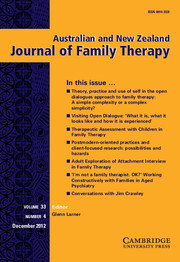Article contents
Interview With Michael Kerr
Published online by Cambridge University Press: 02 March 2012
Abstract
The following article was written by Dr Michael Kerr in response to questions put to him by Barbara Fraser, Linda Mackay and Lu Pease when he visited Australia two years ago. These three family therapists took it upon themselves to prepare this interview in recognition of Dr Kerr's unique vantage point on Bowen Theory and family therapy. Michael Kerr was trained by Murray Bowen in the 1970s and subsequently went on to work as faculty at the Georgetown Family centre. He succeeded Bowen as director of the centre where he has devoted his professional life to the understanding, application and extension of theory. He is the co-author with Dr Bowen of Family Evaluation: An Approach Based on Bowen Theory (Kerr & Bowen, 1988), which remains the most esteemed text on this theory. He is also the editor of Family Systems: A Journal of Natural Systems Thinking in Psychiatry and The Sciences. Bowen's Family Systems Theory grew out of years of research from the 1950s–1970s, which included observations of inpatient families with a schizophrenic member and using data from Bowen's own interactions with his family of origin (Bowen, 1978). The theory continues to be influential in family therapy, with its most well-known contributions being the process of triangling, the intergenerational transmission of family patterns and the concept of differentiation of self. (Brown, 1999). The following discussion from Dr Kerr brings a fresh perspective on the current applications and developments of this systems theory.
Keywords
- Type
- Interview
- Information
- Australian and New Zealand Journal of Family Therapy , Volume 31 , Issue 1 , 01 March 2010 , pp. 100 - 109
- Copyright
- Copyright © Cambridge University Press 2010
- 1
- Cited by




